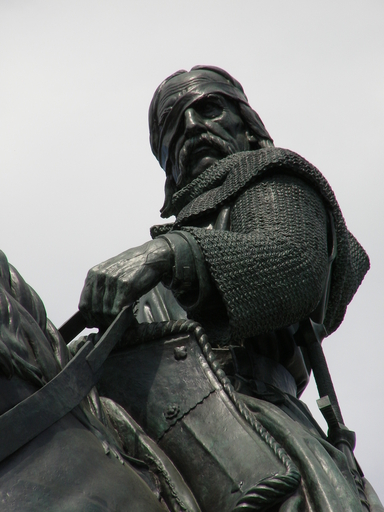
One of the most important Czech military leaders. As the commander of the Hussite armies, he contributed significantly to the success of the Hussite revolution and to the development of the Hussite military doctrine. He won all the battles in which he took part as the leader of the Hussite armies.
1360, Trocnov – 11 October 1424, Přibyslav
Jan Žižka of Trocnov came from an impoverished South-Bohemian yeoman. His name first appears in sources from 1378 and at the beginning of the 15th century he is mentioned as a mercenary. From 1414 he served at the court of Wenceslaus IV, King of Bohemia. It is unknown when he became a Hussite, but in 1419 he took part in the First Defenestration of Prague, after which the Hussites took control of Prague’s New Town, and after that he began serving in the Hussite army. He served in Plzeň at the beginning and after that he went to Tábor together with other Hussites. On his way, he defeated a superior force of Catholic knights at the Battle of Sudoměře on 25 March 1420, during which he successfully used war wagons, which soon became the basis of Hussite warfare. In March 1420 he was elected one of the four hetmans of Tábor. He achieved his second major victory on 14 July 1420 at the Battle of Vítkov Hill, which thwarted King Sigismund of Luxembourg’s attempt to capture Prague and thus defeated the first anti-Hussite crusade. During the siege of Rabí Castle in June 1421, Žižka’s other eye was wounded (he had lost the first one in his youth) and he was blind for a short period of time. However, this did not prevent him from crushing Sigismund’s armies of the second crusade at the battles of Kutná Hora and Německý Brod late in 1421 and early in 1422.
Contemporary sources described the Táborite leader as a courageous, honourable and humble man. At the same time, he was strong of faith and un uncompromising defender of the Hussite faith. He did not hesitate to murder the inhabitants of those places that did not surrender to him, destroy monasteries and persecute monks (the opponents of Hussitism were equally cruel, though). His uncompromising attitudes eventually brought him into a conflict with the other representatives of the Tábor community, therefore in 1423 he went to eastern Bohemia and founded his own union of towns, the so-called Orebites, with its own field army. After that, he fought several battles against the moderate Hussites led by Prague but in 1424 the two fractions made peace and joined forces for a campaign in Moravia, during which Žižka unexpectedly died.
Žižka’s name stirred strong emotions when he was still alive; the Hussites praised him as an almost ideal knight whose chivalry made the revolution possible, while for the Catholics he was an embodiment of the devil, a murderer and thief whose blindness was an expression of spiritual blindness. The National Revival, on the other hand, made Žižka a brave defender of the Czech people, an ideal of progress, freedom, liberty and democracy; with small modifications, this view was dominant until as late as 1989. Although since that time he has been subjected to the necessary but often exaggerated criticism, he is still regarded in the Czech society as one of the greatest figures of Czech history.
2016-2020 ABCzech.cz - © Filozofická fakulta Univerzity Karlovy
Content from this website may be used without permission only for personal and non-commercial purposes and with the source cited. Any other use is allowed only with the authors' consent.
This web application Sonic.cgi meets GDPR requirements. Current information can be found here.